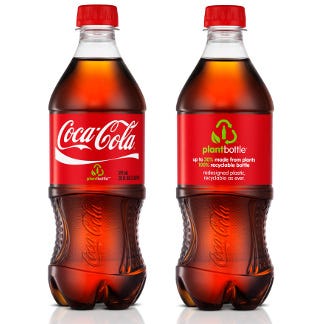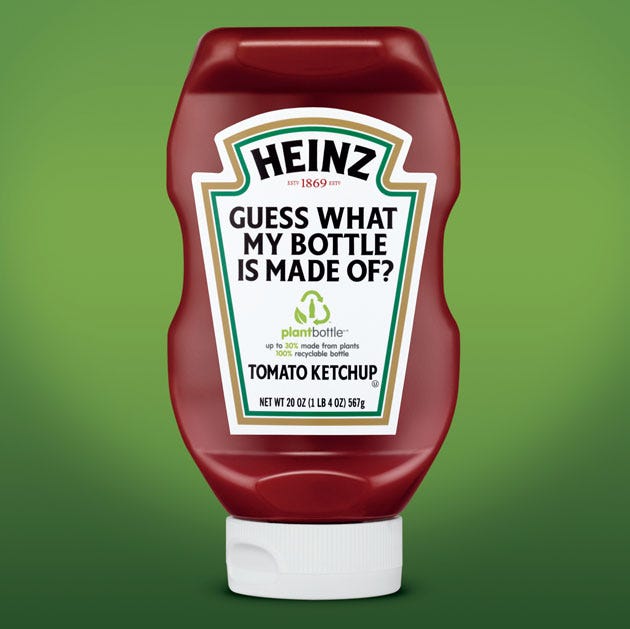Coca-Cola GM of PlantBottle packaging talks new partnerships, future growth
It's hard for Scott Vitters, GM of the PlantBottle packaging platform, to contain his excitement about the future for the Coca-Cola PlantBottle packaging.
October 24, 2012
It's hard for Scott Vitters, GM of the PlantBottle packaging platform, to contain his excitement about the future for the Coca-Cola PlantBottle packaging.
"We're in a phase of the journey of not just highlighting the technology but helping people understand how we build a supply chain that is truly sustainable," Vitters told PlasticsToday. "We have been able to drive top line growth for innovation for both loyalty and purchase intent. While we're still learning how to best leverage the technology on different brands, we are encouraged by the consumer reaction to the technology."
 Since launching its PlantBottle packaging in 2009, Coca-Cola has sold more than 10 billion PlantBottle packages around the world and the packaging is available in more than 24 countries worldwide. By the end of 2012, Vitters said Coca-Cola will have converted about 8% of its standard PET bottles to the PlantBottle packaging technology.
Since launching its PlantBottle packaging in 2009, Coca-Cola has sold more than 10 billion PlantBottle packages around the world and the packaging is available in more than 24 countries worldwide. By the end of 2012, Vitters said Coca-Cola will have converted about 8% of its standard PET bottles to the PlantBottle packaging technology.
The fully recyclable PlantBottle is 30% biobased, with the MEG portion derived sugarcane ethanol, and the other 70% from petroleum based PTA.
Currently, PlantBottle uses sugarcane ethanol from Brazil, which is one reason Coca-Cola recently announced a partnership with JBF Industries Ltd. to further expand production of the plant-based material used in the PlantBottle packaging. Coca-Cola hopes this partnership will get the company closer to its target of using PlantBottle packaging technology in all of its plastic bottles by 2020.
Indian polyester and packaging group JBF Industries will build the world's largest facility to produce bio-glycol, the key ingredient used to make PlantBottle packaging. The facility, which will be located in Araraquara, Sao Paulo, Brazil, will produce the ingredient using locally sourced sugarcane and sugarcane processing waste. The state of Sao Paulo is the largest producer of sugarcane in Brazil and the region of Araraquara is its most dense sugarcane plantation area, said Rohit Maindwal, COO of JBF.
"The location has been selected based on the proximity to the ethanol feedstock availability with more than 35 ethanol producers located in a radius of 70 KM from the bio-MEG plant location in Araraquara," he said.
JBF and Coca-Cola already had a strong PET business relationship. JBF is a supplier in the growing domestic market of India and from its UAE operations, JBF supplies resins to various Cola-Cola destinations across the globe.
"JBF has shared our vision of the PlantBottle driving environment and economical growth for PET plastic," Vitters said. "I think our history with the company, their real commitment, and where we see the PlantBottle packaging in the future, is a nice combination for the next step in this journey."
Construction on the new facility is expected to begin at the end of this year and last for 24 months. At full capacity, it is estimated the facility will produce 500,000 metric tons of material per year. By using plant-based materials instead of non-renewable materials, the facility will remove the equivalent of 690,000 metric tons of carbon dioxide or the equivalent of consuming more than 1.5 million barrels of oil each year.
This marks the first investment JBF Group has made in Brazil, Maindwal said. The total investment of JBF for this project is estimated at $450 million. The facility will provide 125 direct jobs and almost 1500 indirect opportunities for employment.
Vitters said the company's expectation is that the plant will eventually convert all of its Brazilian virgin material to the PlantBottle technology as well as reach other markets globally.
"When you look at capacity that is 500,000 metric tons of material, that's a good size plant and indicative of where the market sees the growth in this technology," he said. "We have highlighted the fact our expectations are to have local plants in regions all around the world to meet the need."
Partnerships driving growth
Vitters said whenever a company develops a breakthrough technology; there is a notion to "hold on to it yourself."
"What we realized is that this technology is bigger than Coke, which is one reason why we enabled partners like Heinz," he said. "From a strategic standpoint, it was around engaging the supply chain community to see the potential in this space as we are building it out. We are interested in continuing this and are talking with others about that potential as we build to not only meet our needs, but meet the needs of others."
Heinz," he said. "From a strategic standpoint, it was around engaging the supply chain community to see the potential in this space as we are building it out. We are interested in continuing this and are talking with others about that potential as we build to not only meet our needs, but meet the needs of others."
Heinz uses the PlantBottle packaging as part of a strategic partnership with Coca-Cola. Currently, all 20-ounce Heinz Ketchup bottles in both retail stores and in restaurants are made with PlantBottle packaging.
This past June, Coca-Cola, Ford Motor Co., Heinz, Nike, and Procter & Gamble joined forces to accelerate the development and use of 100% plant-based PET materials in their products, building upon Coca-Cola's technology.
Together, these five brands have formed the Plant PET Technology Collaborative (PTC), which will support new technologies in an effort to evolve today's material that is partially made from plants to a solution made entirely from plants.
In addition, Coca-Cola had previously announced partnerships with Virent, Gevo and Avantium to take its PlantBottle from 30% renewably sourced to 100%.
"With the emergence of world scale plants, we are showing this is definitely real, not just a 'green' idea," he said.
About the Author(s)
You May Also Like


